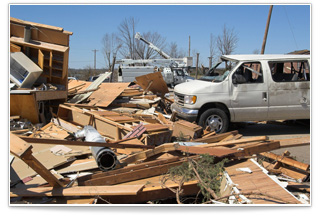Storms, especially hurricanes, can cause catastrophic damage along coasts and several hundred miles inland. They also trigger deadly floods, tornadoes, landslides and torrential rains. The tips below can help you, your family, and your firm prepare for a variety of natural disasters.
Before a Storm Threatens

- Reinforce structures. Homes that meet or exceed current building codes for your region have a much greater chance of withstanding a natural disaster. A housing inspector can offer advice for fortifying your home.
- Consider flood insurance. Standard homeowner policies do not provide coverage for floods. Talk to your homeowner insurance representative about coverage through the federal government’s flood insurance program. Don’t wait. In most cases, there is a 30-day waiting period before coverage takes effect.
- Plan for shelter. In a house, identify a small interior room, closet or hallway on the lowest level where you can wait out a storm if you’re not told to evacuate. Do not stay in a mobile home or high-rise during a hurricane, for instance.
If a Storm May Be Heading Your Way
- Stay informed. Follow weather and news reports. Obey evacuation orders.
- Limit flying debris. Move toys, garbage cans, patio furniture and other yard items into your house or garage.
- Be ready. Fill your car’s gas tank. Fill the bathtub and large containers with water to use for cleaning and hygiene if you lose your water supply. Turn the refrigerator and freezer to their coldest settings and keep the doors closed as much as possible. Turn off propane tanks and, just before the storm, circuit breakers. Turn off utilities if instructed to do so.
During the Storm
- Avoid using utilities. Rely on battery-powered flashlights and lanterns. Don’t use the telephone except in emergencies.
- Stay in your shelter. Close all interior doors and brace external doors. Keep curtains and blinds closed. Stay in your interior room, away from windows and glass doors. Lie under a sturdy object, if necessary.
- Don’t be fooled by the calm. The worst part of the storm happens after the eye passes and the winds blow from the opposite direction. Be alert for tornadoes during and after hurricanes.
To learn more about hurricanes and other natural disasters, visit the National Weather Service at www.nws.noaa.gov/safety.php.
Evacuate Fast
- A disaster could force anyone to leave home. Be ready to act.
- Keep a map in the car and your gas tank at least half full. If you don’t have a car, decide now how you would get out.
- Bring your pets and your emergency supply kit.
- Take routes specified by officials. Shortcuts may be impassable.
- Depending on the situation, you might have days or only minutes to escape. Do what time allows.
- If told to, turn off water, electricity and gas. (Never try to turn gas back on; a professional must do this.)
- Carry driver’s licenses, emergency contact numbers, insurance cards, bank account info and other documents in a waterproof container.
- Make a reservation at a hotel or call friends or relatives you can stay with.
- Call or email your out-of-state family contact to say where you are going.
- Leave a note at home saying when you left and where you were headed.
- Depart early to avoid traffic jams.
Keeping Your Pets Safe
Take These Steps Right Away:
- When choosing evacuation destinations, make sure they will welcome your pets.
- Prepare a pet emergency kit with at least a three-day supply of food and water, plus bowls, leashes, harnesses, medications, medical records and current photos.
- Arrange to have a trusted neighbor bring your pets to a family meeting spot if you’re unable to get home during a disaster. The neighbor will need a key to the house and must know where to find your pet kit.
- Make sure your pets have identification. Microchips are strongly encouraged.
When Danger Looms, Do the Following:
- Keep your animals with you, whether you seek shelter at home or evacuate—even if you expect to be away only a short time.
- If staying home, confine pets in one room.
- If evacuating, write your temporary contact info (or your family contact’s phone number) on tape and stick it to the back of your pets’ regular ID tags. Use carriers for smaller animals and sturdy leashes for large dogs – even well-behaved pets may bite, scratch or run away when frightened.
After a Disaster
Report property damage to your insurance company as soon as possible, and do what you can to prevent further damage.